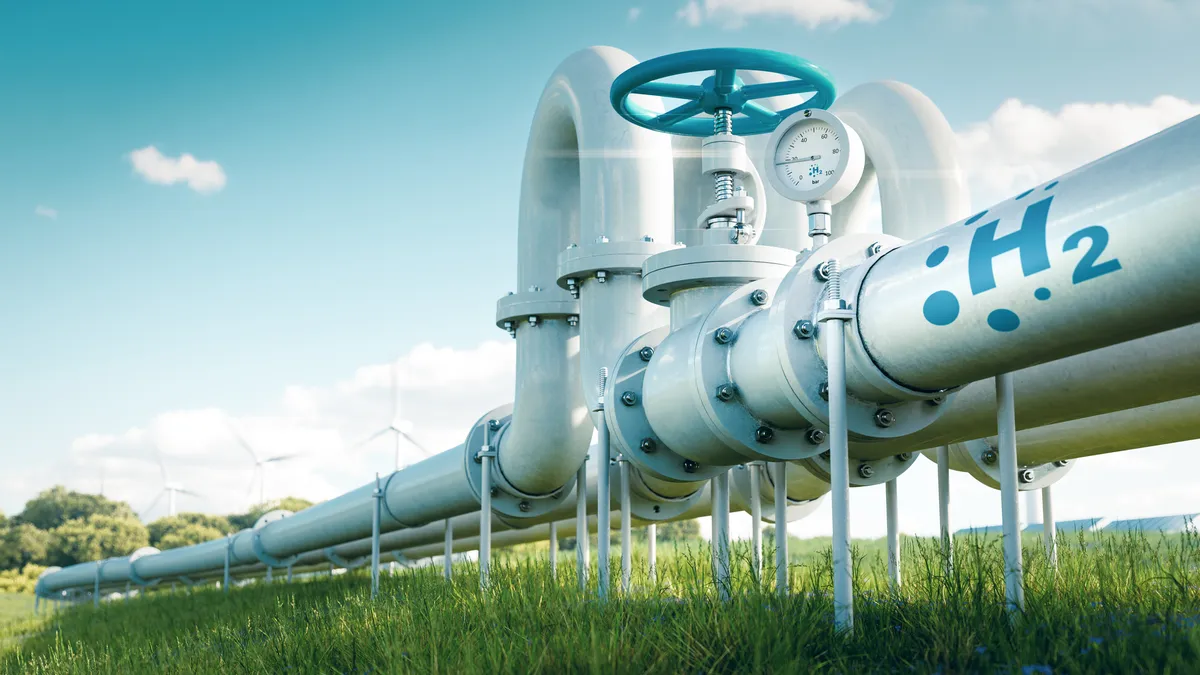Dive Brief:
- Two groups of states have announced their pursuit of federal “hydrogen hub” funding. Seven Northeastern states are seeking a $1.25 billion share of $8 billion in available federal funding, the New York State Energy Research and Development Authority, or NYSERDA, said Friday.
- The Midwest Alliance for Clean Hydrogen announced Monday it has submitted an application to the U.S. Department of Energy to develop a regional hydrogen production and disribution hub.
- DOE said it received 79 concept papers last year, spanning every region in the country in response to the “funding opportunity.” DOE in December encouraged 33 projects with $96 billion in cost-sharing proposals to submit full applications that were due Friday.
Dive Insight:
Including the federal portion, the proposal submitted by the Northeastern states to DOE from Connecticut, Maine, Massachusetts, New Jersey, New York, Rhode Island and Vermont represents a $3.62 billion commitment and more than a dozen projects, NYSERDA said.
Federal funding from the bipartisan infrastructure bill is available over five years, potentially funding efforts by the Northeast Hub and similar ventures to capitalize on the decarbonization opportunities from clean hydrogen and reduce emissions in the industrial, transportation and power sectors.
The seven-state project, if approved by DOE, is intended to link hydrogen producers and users and their related safety safety experts, manufacturers, the research and development community, workforce organizations and labor representatives. Awards are anticipated to be announced this fall, NYSERDA said.
Massachusetts Gov. Maura Healey, D, said the proposal provides an opportunity to “leverage substantial federal funding to begin building a market for clean hydrogen that will address some of our most difficult to decarbonize sectors.”
The project would include electrolytic hydrogen production, or hydrogen made without creating greenhouse gas emissions using clean electricity and water; use of hydrogen to complement electrification; and would focus on community engagement, safety, climate, environmental justice and diversity and equity, NYSERDA said.
Northeast Hub projects include clean electrolytic hydrogen production for use in transportation, high-temp industrial thermal and communal utilities for heat that represent hard-to-decarbonize sectors, NYSERDA said.
If selected for an award by DOE, the Northeast Hub projects will complete four phases of development over 10 to 12 years. They include technical data and analysis, community engagement and impacts, engineering, permitting and safety, business development and management, procurement and construction and operations.
While DOE completes the application review process, the list of projects, locations and organizations in the Northeast Hub will not be made public, NYSERDA said.
Six of the seven Northeast states are among 31 that have each submitted a proposal for one hub, according to a map by the Clean Air Task Force, a nonprofit. New Jersey is among 10 states proposing plans with two hubs and four states — Ohio, Missouri, Pennsylvania and Texas — have submitted proposals with three hubs.
Alaska, Florida, Idaho, New Hampshire and South Dakota have not submitted applications, according to the Clean Air Task Force.
Of the 79 Concept Papers, 46 were discouraged from moving forward for several reasons, DOE said, but it generally rejected those describing only one element of a hub. Also discouraged were projects that would depend on technologies unready for commercial scale demonstrations and with elements not “readily suited” to help catalyze a national clean hydrogen network.














